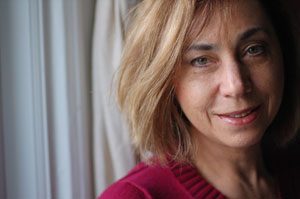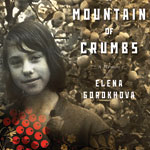
Growing up in the Soviet Union during the 1960s, Elena Gorokhova developed a fascination with the English language. Simple English terminology that filtered into her consciousness suggested a world diametrically opposed to the drab environment she knew in her native Leningrad. She was puzzled by the word “privacy.” Such a thing did not exist in the Soviet Union. She was amazed by the idea of a living room, a space that serves “no basic function.”
Gorokhova’s attraction to English led to her mastery of the language and her ultimate move to America 30 years ago. Now she has given us—in spare and eloquent English—a powerful memoir of her Russian childhood. A Mountain of Crumbs (Simon & Schuster, 2009) is often compared to Angela’s Ashes, Frank McCourt’s heralded memoir of his childhood in Ireland. As it happens, Gorokhova’s writing is much influenced by McCourt with whom she studied—after her arrival in America, of course.

Courtesy of publisher.
While the McCourt family in Angela’s Ashes was torn apart by poverty and human frailty, the hearty folks in Gorokhova’s book learned to make due with what their totalitarian society gave them. The title of Gorokhova’s book is based on the “crumb game” that her grandmother invented during food rationing in the 1920s. She would mince up a piece of black bread and a cube of sugar and mold the crumbs into little mountains to distract the hunger of her infant son (Elena’s uncle).
Today, hunger is a thing of the past for Elena Gorokhova. She has lived in New Jersey since 1980, first in Nutley, now in Ridgewood. She has earned a doctorate in language education from Rutgers and is a full-time faculty member of Hudson County Community College, where she teaches English as a second language.
New Jersey Monthly caught up with Gorokhova for this interview on a snowy winter day worthy of the Leningrad she knew as a child. Here are excerpts from the conversation:
What amazes me about the book is how your imagination developed despite living in a Soviet world that seemed to be without any color.
It was a pretty drab world. When there is so little around you, it makes you make things up and look elsewhere. That creative part in me was associated with learning the English language.
So English fed your imagination?
I started learning English when I was 10. It contained this quality of the unknown. It was something unheard, fascinating, and mesmerizing. It sounded and looked so appealing.
But you also were fascinated by the characters in the Russian books that you read. They also seemed to fire your imagination.
Yes, Russian literature. You almost had to put yourself in the book.
Do you think it was unusual for a child growing up in the Soviet Union in that time to have such a vivid imagination?
I don’t think I was unique. I was pretty typical. One thing we all had, we all told jokes. It was a valve, part of the escape. Some were political. They would circulate. Of course, they were never printed anywhere. But we all had something like that. We all wrote poetry and stories to escape the dreariness.
Does the voice that we hear in your book reflect the thoughts of childhood or is it a grownup viewing childhood in retrospect?
When you are writing a memoir [of childhood] you are looking back from an adult point of view. You are not 10 years old. You do filter it through your age. In every memoir there is the young voice and then there is the adult comment. And they have to merge or else there are seams that the reader can see.
I found it interesting that there was no mention of religion in your book. Was religion completely absent from Soviet life in the 1960s and 70s?
It was a completely atheist society. All the churches had become something else.
Your mother was a doctor and your father a Communist party functionary. Your family had a dacha [summer house] by the sea. Did you live what we would consider a middle-class existence? Were you privileged?
There is a lack of parallels. You have to understand our summer house was just a rambling shack. Just two rooms and someplace we could plant a garden. If we were ever privileged it was when my father was alive, and he died when I was 10. He was a party member and he did have some perks. He had a car and a chauffeur to drive him around. After he died it became quite different.
But your mother was a doctor.
Doctors made less than bus drivers, because doctors did not produce any goods. People ask about this. It is difficult for me to explain.
You describe this painful form of split personality where everyone in the Soviet Union has two selves – the one they show in public and the one they hide. You’ve lived in America since 1980. Has this split gone away?
The two halves are healing and getting together. In this country there is no institutionalized lie … This huge lie existed in the Soviet Union where you could not show your real self to people you did not trust. We were all damaged by that system. Not those who left as children, but all of us who left as adults. I had already been damaged. Once in a while, I still relapse to this old paranoia.
In 2004, you took a writing seminar with the great memoirist Frank McCourt. You told me how McCourt taught you to look for the “hot spots”—significant moments in your life when things changed. How did his teaching help you in your writing?
The voice changed. It became more ironic. Color appeared. That’s when it all clicked.
McCourt followed up Angela’s Ashes, the story of his impoverished childhood in Ireland, with ‘Tis, which describes his adjustment to life in America. Can we expect a sequel from you?
I started working on something set in Russia. It’s going to be more of a work of fiction but it is based on the experiences of my mother and my sister.
But everyone who reads A Mountain of Crumbs is left hanging at the end, wondering what it was like for you when you arrived here. You’ve got to tell that story.
Is that what you think I should do? (Laughs.) Maybe I will do that if you think so.
